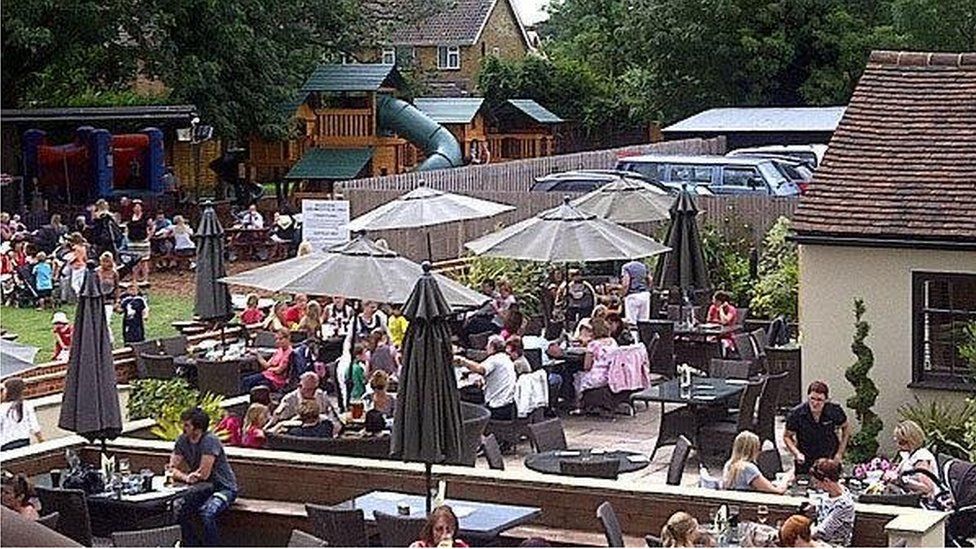More than a million workers came off the furlough scheme in May as the economy reopened, leaving the scheme supporting the fewest people since the start of the pandemic.
At the end of May, 2.4 million people still relied on the scheme for their income, the latest HMRC figures show.
The furlough measures are being phased out by the end of September.
But with parts of the economy still limited by the virus, some firms are calling for an extension to the scheme.
Economists say the uncertainty facing many businesses, and the reduction in government support, will lead some companies to lay-off furloughed workers.
Terry George, who owns the Mission night club in Leeds as well as several other venues, said he expected some of his staff would be made redundant as a result of the phase out of furlough.
"We can't afford to pay people out of a pot that has no money coming in," he told the BBC's Today programme. "We're going to have to lose some staff."
He called for the scheme to be extended until businesses such as his were back up and running.
"We were told that we were going to be back in June, obviously that's been extended a month," Mr George said. "So the easiest thing to do would be to just extend the furlough scheme, as it was, until until things have got [back] to the same speed."
Over the next three months firms will have to shoulder more of the costs of the scheme as the government starts to wind down the scheme. Staff will continue to receive 80% of their wages, but employers will pay part of that for the first time.
The Institute for Fiscal Studies said shifting responsibility for paying workers back to their employers would lead to some job losses.
"The furlough scheme does need to be wound down as the economy recovers, rather than attempting to keep every job on life support. But this does mean that some will end up unemployed," said Tom Waters, a senior research economist at the IFS.
The Treasury says its furlough funding was still "substantial".
"We deliberately went long with our support to provide certainty to people and businesses over the summer.
"The furlough scheme is in place until September and is amongst the most generous schemes in the world," it added.
Labour questioned whether it was fair to ask bosses to start contributing towards the salaries of furloughed staff if they were not yet permitted to reopen.
"Nightclubs can't open today, they don't know what capacity and rules they will be working under when they do, they have no income, they are still racking up debts, and today they have to start paying towards furlough payments," said Jeff Smith MP.

What is changing?
From 1 July, employers must pay 10% of their furloughed workers' usual wage, while the government will continue to pay the other 70%.
From 1 August, the employers' contribution rises to 20%, with the government's contribution reducing further.

Estimates from the Office for National Statistics' weekly survey suggest that the numbers on furlough continued to fall in June, leaving between 1.3 million and 1.9 million people on the scheme.
The government has spent £66bn on the Coronavirus Job Retention Scheme, as furlough is officially known, and it has supported 11.6 million jobs since March 2020.
At the end of March this year, more than a third of employers still had staff on furlough. But since then, the gradual opening up of non-essential retail and large parts of the hospitality sector has allowed many of those workers to return.
Now only about one in 20 workers who are employed by businesses are either fully or partially furloughed.
However, some workers in sectors that have been particularly hard hit by measures to curb the pandemic, such as night clubs and international travel, have been furloughed for many months.

'I felt so guilty!'

Gemma Walker, 36, from Bradford, loves her job as an account manager for Newmarket Holidays. But because she's on furlough she hasn't seen clients or gone into the office for 15 months.
She can see the scheme has been a lifeline for the business, but for her, the experience has been hard.
"I felt an overwhelming sense of guilt about the colleagues at Newmarket who are still working," she says. "They've really held the fort for the rest of our team."
She used to travel around the country, talking to clients and going to conferences.
"When something like that is completely taken away from you, you almost feel lost," she says. "My purpose is gone now because this is what I've worked towards my whole career, starting way back when I was 17 years old.
"I went through a stage of making sure I set an alarm every morning getting up," she says.
"You have to get yourself in a mindset of, 'I have to carry on, I have to do something,' because I don't know when I'm going to be going back."

'Critical' support
The furlough scheme has been praised for providing workers with some security. Unemployment has remained below 5%, despite early fears it would rise much higher as the pandemic pulled the rug from under the economy.
Employers welcomed the scheme as a way to retain staff that were trained and qualified, who they wanted to keep in place for when they were able to reopen.
"We've tried to retain as many people as possible," said Mark Vincent, chief financial officer at travel company, Newmarket Holidays.
"The furlough scheme has been critical. It's part of the difference between survival and not."
But he said that realistically, travel firms, which have had two summers of interrupted business, might need to reconsider staffing levels.
"In those winter months, we're all going to be loss-making and therefore, we're going to have to relook at what we do with our staffing."


The hundreds of billions in support has been dizzying, historic, and effective at keeping unemployment much lower, but now the great rollback begins.
Though the economy is bouncing back strongly, this is a moment of acute sensitivity, as businesses start to discover which will keep going as government support is slowly withdrawn.
The most significant change will be a reduction in the generosity of the furlough scheme, which paid the equivalent of 80% of wages, but will now be funded at the rate of 70%.
Employers must find the equivalent of a tenth of their workers' wages, with that proportion increasing next month.
A report from the Resolution Foundation think tank warns that it is older workers who have been disproportionately left on the furlough scheme as younger workers have gone back to their jobs.
The holiday for stamp duty will also begin to be tapered, the business rates holiday becomes less generous, and delayed payments for VAT will restart.
All this comes with restrictions still in place, and some sectors, such as travel, very unlikely to get back to normal soon.
Business groups representing small businesses have warned of a serious economic flashpoint.

'A lot of people didn't come back'
Steve Haslam, who owns pub chain TLC Inns, is sceptical of the benefits of furlough.
"I am so grateful for the government to have supported my team because, by supporting the team on furlough, my employees, they managed to live and pay their bills."
But he says it has not helped him retain staff.
"A lot of people didn't come back to work... because they just didn't want to come back, either into the industry or they'd gone off and found second jobs. We had one site where 80% of staff left."
He believes the end of furlough will make it easier for hospitality businesses like his to recruit new staff.

At the start of the pandemic, most of those on furlough were in younger age brackets. They were staff working in hospitality, travel, arts and leisure.
But as the economy has reopened, many younger workers have returned to work. Now about half of the people left on furlough are over 45, according to the Resolution Foundation.
The think tank says that older workers on furlough are now more likely to be let go, if businesses decide to restructure in the face of uncertainty.
"Reopening the economy has led to a surge in people returning back to work from furlough, particularly young people in sectors like hospitality and leisure," said Karl Handscomb, senior economist at the Resolution Foundation.
"But not everyone is back working. Over one in four older workers who were furloughed during the recent lockdown have remained parked on furlough during the reopening, and now face a higher risk of unemployment as the scheme starts to be unwound."
Low numbers
As furlough numbers fall the number of people leaving their jobs will rise, said Tony Wilson, director of the Institute for Employment Studies.
But he added: "Whether that leads to a significant rise in unemployment remains to be seen."
Given the strength of the economic recovery, the number of job vacancies being advertised, and the fall in the number of people on furlough since the beginning of the year, Mr Wilson said the number of people being made unemployed could be in the "low hundreds of thousands rather than the millions" as feared last year.
He said that by September, when the scheme ends, the number of people on full furlough "will be pretty low indeed".

Are you currently on furlough? You can share your experience by emailing haveyoursay@bbc.co.uk.
Please include a contact number if you are willing to speak to a BBC journalist. You can also get in touch in the following ways:
- WhatsApp: +44 7756 165803
- Tweet: @BBC_HaveYourSay
- Upload pictures or video
- Please read our terms & conditions and privacy policy
If you are reading this page and can't see the form you will need to visit the mobile version of the BBC website to submit your question or comment or you can email us at HaveYourSay@bbc.co.uk. Please include your name, age and location with any submission.
https://news.google.com/__i/rss/rd/articles/CBMiLGh0dHBzOi8vd3d3LmJiYy5jby51ay9uZXdzL2J1c2luZXNzLTU3NjY1NzM10gEwaHR0cHM6Ly93d3cuYmJjLmNvLnVrL25ld3MvYnVzaW5lc3MtNTc2NjU3MzUuYW1w?oc=5
2021-07-01 10:18:50Z
52781706400477
Tidak ada komentar:
Posting Komentar